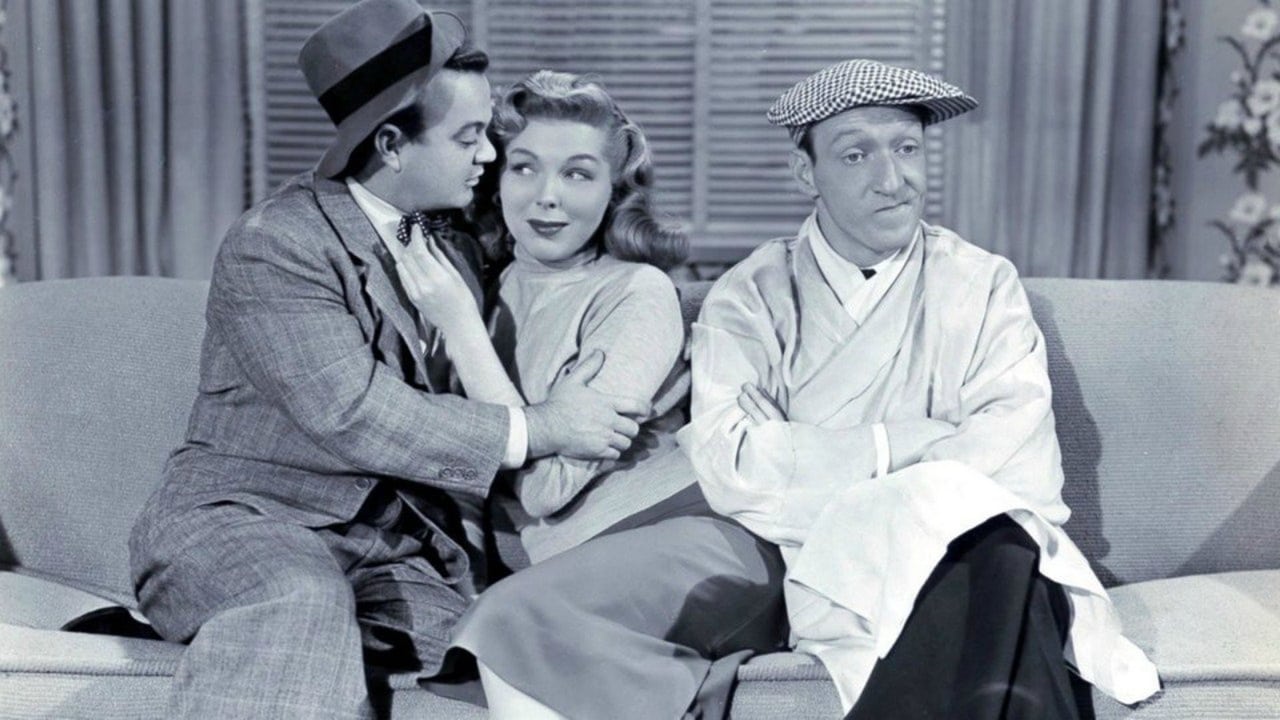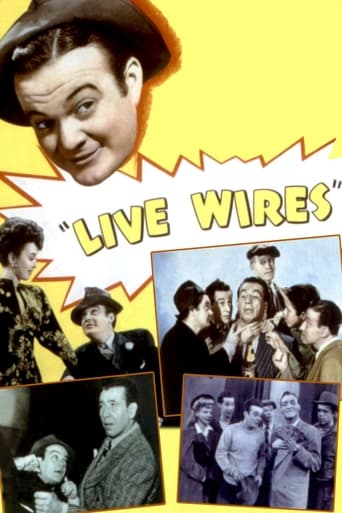Paularoc
You either like the Bowery Boys films with their low brow humor or you don't. I like them. They're silly, funny, and light hearted. Slip gets and loses one job after another for being too hot tempered and quick with his fists but since his sister who he lives with has a steady job he doesn't worry about it. That is, until she gets fed up and insists he get a steady job. He first thinks he's going to make a bundle as a street peddler selling Pierce's Peerless Stain Remover. In this skit, Gorcey well demonstrates how very good he was at patter. Of course, the peddler scam doesn't work out and he then gets a job at the repossession firm that Sach is working at (somewhat surprisingly Sach has a steady job). They get the assignment of finding a couple of crooks, Patsy Clark and the crook known as The Pidgeon. Slip tells the boys that in tracking down Patsy they'll first make a list of the possibilities and then "It's just a process of illumination." Slip does indeed find Patsy who turns out to be a towering, violent and menacing crook played by Mike Mazurki. There are a number of pretty funny bits in the movie but my favorite was the scene at the high class nightclub, the 'High Hat' where Slip takes his girlfriend as part of a car repo job. After hearing from Slip that "money is no objection," the snooty waiter recommends a 1928 champagne. Slip and his girlfriend are mightily annoyed and insist that the waiter bring something newer than that.
sol1218
***SPOILERS*** First of the "Bowery Boys" films has Slip between jobs living with his sister Mary who's getting a bit sick and tired of always supporting him. Finally landing a job with his friend Sach's help at the D.A's office handing out summons Slip is now well on his way to become a both productive and tax paying citizen. It's when Slip is sent out to a local women's clothing boutique to hand out a summon to it's owner that he finds out just how dangerous his job really is.Thinking he's to hand out a summon to a woman named Pasty Clark, to testify against her boss, Slip finds out that the person is not only a man but ex-convict Pat Clark played by ex-professional wrestler and all star collage defensive back 230 pound six foot five five inch tall Mike Mazerki! The very playful Mazerki,or Pat Clark,thinking that Slip is a fellow cell-mate of his shows his hospitality towards him by bouncing the almost totally unconscious Slip against the wall of his office as if he were a Ping Pong ball! It's only when Pat's friend and fellow mobster Red showed up it was discovered that Slip who had put Red to sleep, by belting him earlier in the movie, is not the person that he said he was!With Slip's fellow "Bowery Boys", Sach Homer Bobby & Whitey, rushing to his aid all they do is get worked over by Pat who's finally subdued when what seems like the entire local police precinct comes to rescue the rescuers! It's during that ruckus that it's discovered that Pat & Red's boss, the Boss of Bosses in the New York City underworld, is non other then Herbert Sayers! The person who Slip had previously worked for, and got fired by, as well as Slip's sister's employer who works for Sayers as his private secretary!With Sayers now planning to leave the country and fly to Mexico, before the police can arrest him, It's now up to Slip and the boys to stop and capture him in that he's taking Slip's sister, who has no idea of his criminal background, along with him! Sayers plans to either use Mary as a hostage or human shield if he's stopped at the border, or airport, by the local law enforcement personnel!What's so usual about this first "Bowery Boys" movie is that the usually nutty Sach is about the most normal of the bunch. Not only is Sach the only one of the "Bowery Boys" to be game-fully employed but also the best dressed of the entire lot! There's also Bernard Grocey, Slip or Leo Grocey's real life dad, in the movie not as whom we later got to know as Sweet Shop owner Louie Dumbrowsky but as the local neighborhood bookie Jack Kane!
ksf-2
Well, this one opens with Slip Mahoney (Leo Gorcey) losing his job as a taxi driver, and coming home to his sister Mary (Pamela Blake) and friends... check out that dolled up, rolled-up 1940s hair-do on Blake! Huntz Hall is "Sach Jones", Slip's sidekick; Acc to IMDb, they would work or appear together 69 times! Keep an eye out for Bernard Gorcey (Leo's real dad) as Jack Kane at the soda fountain. Also keep an eye out for Bill Benedict, the blond-haired tall skinny guy in all those films from the 1940s.. he was called "Whitie" in most of the roles he played. Slip tries various schemes to earn some money, with mixed results along the way... mostly bad. This post- WW II film shows life on the gritty side of town, and the difficulty in getting work, with some humor thrown in along the way. Not bad. A film that's short & sweet, mostly a more mature version of the "Muggs Maloney" characters Gorcey had played in the early 1940s. A bit more slapstick right at the end than I like, but they got some mile-age out of real-life wrestler Mike Mazurki. Also a pleasant number "The Right Kind of Man" sung by Claudia Drake in the nightclub. Phil Karlson directed this 65 minute shortie from Monogram Pictures.
Brian Camp
The East Side Kids, knockoffs of the Dead End Kids, appeared in 21 films at Monogram Pictures from 1940-45. They became the Bowery Boys in a new series, also at Monogram, starting with LIVE WIRES (1946) and destined to last until 1958. Of the six actors who made up the original Dead End Kids, only Leo Gorcey, Huntz Hall, and Bobby Jordan appear in LIVE WIRES. (Jordan left the Bowery series in 1947 after eight films. Gabe Dell, another former Dead End/East Side Kid, joined the Bowery Boys for the fourth film in the series, but stayed only through the end of 1950.) The East Side Kids films tended to have a gritty, urban feel to them, with dramatic plots, bursts of violence, and characters who looked, sounded and behaved like they hung out on the street 24 hours a day, amidst settings built to replicate familiar slum spaces like cramped tenement apartments, basement clubhouses, alleys, storefronts, warehouses, soda counters, cheap dives, bookie joints, etc. The Bowery Boys films tended to specialize in lowbrow comedy and slapstick hijinks, often sending the Boys on not-so-exotic adventures far from the Bowery.LIVE WIRES has some comedy and familiar schtick, including Gorcey's patented mangling of big words ("why, they'll put me up on a pedestrian") and lots of slapping each other with hats, but it's much more interested in a routine crime tale that gets unnecessarily convoluted as more characters pile on. Slip Mahoney (Gorcey) has trouble holding a job and is seen failing at one thing after another (including a long, tiresome routine involving the sidewalk peddling of a phony stain remover) until he joins Sach (Hall) as a "skip tracer," basically repo men assigned to track down deadbeats and repossess merchandise that hasn't been fully paid for. It's an unlikely profession for these two and not something we'll ever see them do again. Slip does, however, prove quite efficient and, in one clever scene, manages to trick an unlucky nightclub chanteuse out of her coveted convertible. Eventually, the boys are recruited to track down and serve summonses to the ringleaders of a citywide car theft ring. This leads to a comical encounter in the film's final 15 minutes with a childlike but physically aggressive mountain-sized gangster who effortlessly (and "playfully") bounces the hapless Slip off the walls of a well-appointed lounge with a fully-stocked bar. (The gangster is played by third-billed Mike Mazurki as a take-off on Moose Malloy, the not-so-gentle giant he played in the Philip Marlowe film noir classic, MURDER, MY SWEET, 1944, a connection referenced in the ads for LIVE WIRES.) Too much of the film takes place in spacious offices, apartments, stores and a fancy club. You'd think the film actually had a budget. There's very little East Side or Bowery flavor on view. When addresses are given, they're not recognizable Manhattan addresses. (I'm sorry, but there are no "Walnut and 3rd" or "4th and Main" in Manhattan.) Slip's sister Mary (Pamela Blake), who plays the mother figure in his life, has far more screen time than any of the other Bowery Boys, aside from Sach. There's a Louie's Ice Cream Parlor, but no Louie Dumbrowsky. The actor who later played Louie, Bernard Gorcey (Leo's dad), shows up at the parlor here, but as a bookie named Jack Kane. Of the five Bowery Boys, in addition to Slip, Sach and Bobby (Jordan), there are Whitey (Billy Benedict, also a regular in the East Side Kids) and the wildly unfamiliar Homer (played by William Frambes in his only Bowery Boys movie), a farm boy who seems to have wandered off the set of one of Universal's Ma and Pa Kettle films.LIVE WIRES was the fifth film directed by Phil Karlson, who is better known for his violent, hard-hitting crime thrillers from the 1950s (KANSAS CITY CONFIDENTIAL, 99 RIVER STREET, FIVE AGAINST THE HOUSE, THE PHENIX CITY STORY, THE BROTHERS RICO) and '70s (WALKING TALL, FRAMED). He keeps things moving when he can and throws in a couple of action scenes, including a brawl started by Slip at a nightclub, but the script gives him little opportunity to craft anything particularly memorable out of this. Later films in the series would perfect the formula by placing Gorcey and Hall in center stage as a comedy team and putting them in all manner of slapstick situations and crimefighting shenanigans, sometimes keeping them at home in the Bowery and sometimes sending them off to such not-so-very-convincing locations as Paris, London, Bagdad, Las Vegas, the Wild West, the Ozarks, and assorted military bases.

